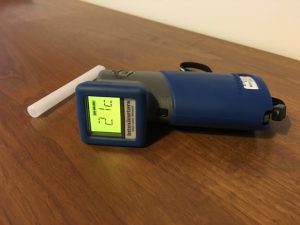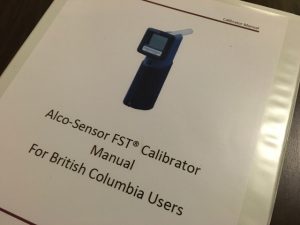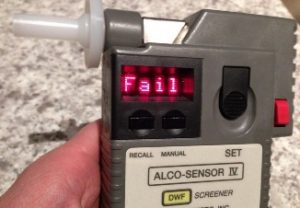 The Approved Screening Device (ASD) is a portable breathalyzer intended to provide a quick and easy way for the police to assess a driver’s sobriety without unnecessarily detaining them for a lengthy investigation. The model of ASD used by the police in British Columbia is the Alco-Sensor FST.
The Approved Screening Device (ASD) is a portable breathalyzer intended to provide a quick and easy way for the police to assess a driver’s sobriety without unnecessarily detaining them for a lengthy investigation. The model of ASD used by the police in British Columbia is the Alco-Sensor FST.
The ASD – How it Works
When functioning properly, a very small sample of breath is extracted from the subject’s breath as it passes through a manifold and out a vent on the back of the ASD. Alcohol from the sample of breath is oxidized becoming acetic acid, then generating an electrical current which is measured and interpreted by the internal software. The results are displayed on an liquid crystal readout.
“The Alco-Sensor FST only recognizes alcohol. The problem is that it cannot differentiate between alcohol from the breath or alcohol in the mouth.”
ASD Breath Results – What They Mean
In B.C. if the police say you blew Fail you will almost always be issued a 90-day Immediate Roadside Prohibition IRP. Fail should indicate that the person’s blood-alcohol content is in excess of 80mg of alcohol in 100 ml of blood (.08%). But this is not always correct (see below).
Alternatively, you may be detained for further investigation and transported to a police station where you will be expected to provide breath samples into a breathalyzer-style device to accurately determine your blood-alcohol concentration. The breathalyzer used at the police station is called an Approved Instrument. The Approved Instrument currently used in British Columbia and Alberta is the Intox EC/IR II which also uses a fuel cell to report breath-alcohol concentration.
If the Alco-Sensor FST indicates that you blew in the “Warn” range, you will be subject to a 3, 7 or 30 day Immediate Roadside Prohibition and vehicle seizure, along with fees payable to ICBC.
The Approved Screening Device commonly used at this time in BC is the Alco-Sensor FST, a device produced by Intoximeters of Saint Louis. The versions sold to Canadian police departments have simplified software to make it easier for Canadian police officers to understand the results. The Alco-Sensor FST used in British Columbia indicates “Warn” between 60mg and 99mg in 100ml and “Fail” if over 100mg in 100ml. Below 59mg it displays the actual BAC.
Problems with the ASD


The Alco-Sensor FST only recognizes alcohol. The problem is that it cannot differentiate between alcohol from the breath or alcohol in the mouth. If there is alcohol in the subject’s blood, it will be exhaled along with the person’s breath. If there is also alcohol in the subject’s mouth, the results will always be elevated and thus inaccurate.
The effect is cumulative, i.e. the device will simply add the alcohol exhaled from the lungs with the alcohol in the mouth. The risk is that a subject who is under 0.05 % with a minuscule amount of alcohol in their mouth may blow “Warn” or “Fail” and the officer will not know it was due to mouth alcohol. It may be common occurrence, but it is difficult to prove. Consequently, drivers in British Columbia may be wrongly punished with IRPs due to inaccurate ASD results.
The RCMP’s internal documents indicate that the ASD has an “error factor” of +/- 10 mg%. In our library of ASD records, we have confidential police documents showing ASDs being out by more than 50% when tested for calibration. Monthly calibration tests are intended to identify faulty devices.
When an ASD is found to be faulty, the police may not notify anyone. The ASD can be damaged in a number of ways, and they may malfunction without an overt indication of a problem. We have records where ASDs simply read “Fail” even is the subject has had nothing to drink. We have records showing individuals having blown Fail on two separate faulty Approved Screening Devices. None of these records are made available to people who apply to dispute their Immediate Roadside Prohibition. When the RCMP determined that their devices were tested using gas that has not been certified, they hid the evidence for nearly three years to stop drivers from being able to sue them.
Many subjects have difficulty providing a sample that the device will accept. Any variation in flow rate of breath can cause the device to reject the sample as inadequate. The operator can only speculate why the sample was rejected. Many of the devices have electronic and mechanical problems. We have records to prove it. None of this is ever reported to the public.
The ASD Calibration Periods
The manufacturer recommends that the Alco-Sensor FST be tested for accuracy every 2 weeks. In Canada we do not follow this recommendation. The police in British Columbia are instructed to test their devices every 28 days to ensure they are functioning within correct parameters. Although the procedural requirements are the same across the province, information is recorded differently in each detachment. Some detachments keep extensive notes so that they can identify if an ASD has a history of malfunctioning. Others record next to nothing about the assurance testing. Calibration procedures are not always correctly followed and the government has taken inadequate steps in our view to regulate their maintenance and inform the public of their malfunctions. For example, there is no law requiring that ASDs be properly maintained. The only way to obtain the service history of an ASD is through Freedom of Information requests. The RCMP delays disclosure for years to ensure drivers cannot get the records they need to prove their innocence.
“The ASDs used in British Columbia do not retain calibration or breath test results in memory or document form. “
Malfunctioning ASDs have been known to display “Fail” when there is no alcohol present. Others have indicated that a subject is not blowing properly when there is nothing wrong with the subject’s manner of blowing. Many people have received 90-day IRPs on the basis of unreliable ASD tests.
The Alco-Sensor FST used in other jurisdictions has the capacity to display the actual blood/alcohol concentration. However, the software in the Alco-Sensor used in BC simply displays “Fail” and “Warn” messages when the reading is in the prohibited range. Other codes may be displayed. The device should only function within a certain temperature range. When malfunctioning, it may appear to operate properly despite the malfunction.
For a more detailed description of the Alco-Sensor FST, please see: Alco-Sensor FST Approved Screening Device
History of ASD Approved Screening Devices
In 1975 the Criminal Code was amended to allow officers to compel a suspected impaired driver to undergo a roadside screening test. The concern was that police officers often lacked the ability to identify DUI and DWI drivers. At the time studies showed that in the early morning hours the driver of 1 in 8 vehicles was DWI.


Ultimately the device was discredited mainly due to the possibility of interference by substances other than alcohol and technological advances that made it obsolete.
The A.L.E.R.T. was believed to be accurate five minutes after the last alcohol consumed. We now know that a false fail is very likely, even if the last drink was 20 minutes earlier. It is likely, therefore, that many people were wrongfully arrested on the evidence of an A.L.E.R.T. “Fail.”
In September 2010 the British Columbia Government enacted new laws to make the ASD the decisive test at the roadside. The new laws introduced lengthy driving prohibitions with significant punishment on the basis of an ASD test result. This approach was controversial. In the first version of the legislation these new prohibitions were referred to as “Automatic Roadside Prohibition” or “ARP.” The BC Government realized that this name revealed that they had created an unfair and unlawful legal scheme and later changed the name to “Immediate Roadside Prohibition” or “IRP.” ASDs were never introduced to be used in such a manner. The ASD was promoted to an evidence gathering device used to inflict punishment.Particularly disconcerting was the frailty of the evidence, the unreliability of the devices and the fact that the ASDs used in British Columbia do not retain calibration or breath test results in memory or document form.
On November 30, 2011, the BC Supreme Court found that the 90-day Immediate Roadside Prohibition legislation violates the Charter of Rights. The Police in BC reverted to the previous method of investigating possible impaired drivers when they have provided a sample indicating “Fail” at the roadside, including detaining the individual for more accurate breath tests obtained at a police detachment.
On June 15, 2012, changes to the Motor Vehicle Act came into effect after the BC Liberals pushed legislation through in the final days of the spring legislative session. The changes brought back the entire Immediate Roadside Prohibition scheme.
In the summer of 2014 the lawyers at Acumen Law revealed a major problem with certain Alco-Sensor IV ASDs used in BC. Litigation was started by Acumen in BC Supreme Court and other venues. The Police in BC then replaced the Alco-Sensor IVs with the newer Alco-Sensor FST.
Innocent people receive IRPs in British Columbia with no true opportunity to challenge the evidence because the police and the government only provide the disclosure they want to provide and ASDs may provide false readings for a number of reasons.
